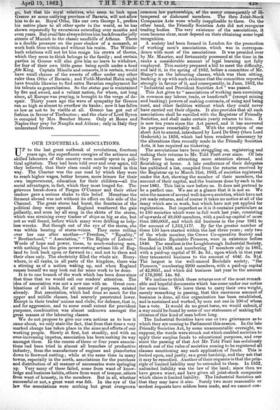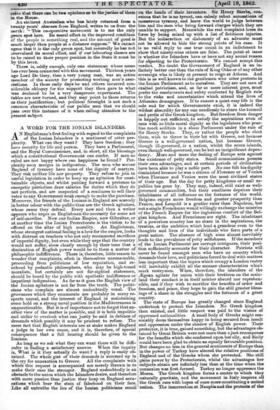01711 IND17STRT A L ASSOCIATIONS.
UP to the last great outbreak of revolutions, fourteen years ago, the superfluous energies of the artisans and skilled labourers of this country were mostly spent in poli- tical agitation. They had been told over and over again, till they believed, that their class could only be raised in this way. The Charter was the one road by which they were to reach higher wages, better houses, more leisure for their own improvement, education for their children—all the social advantages, in fact, which they most longed for. The grievous break-down of Fergus O'Connor and their other leaders gave a serious shake to this belief. Meantime the ferment abroad was not without its effect on this side of the Channel. The great storm had burst, the fountains of the political deep were opened. England weathered the gale gallantly, and soon lay all snug in the skirts of the storm, which was straining every timber of ships as big as she, but not so well found, before which many were drifting as help- less wrecks. But though out of the eye of the storm, she was within hearing of storm-voices. They came rolling over her one after another—" Freedom," "Equality," " Brotherhood," "Association," "The Rights of Labour." Words of hope and power, these, to much-enduring men, with nothing but the grim never-resting artisan life of Eng- land to look back upon or forward to ; and not to them and their class only. The electricity filled the whole air. Every- where, in all ranks, in all parts of the kingdom, there was a stirring as of a nation waking up, and when England rouses herself we may look out for some work to be done.
It is to one branch of the work which has been done since that time that we would call our readers' attention. The idea of association was not a new one with us. Great com- binations of all kinds, for all manner of purposes, existed already. But association, which had done so much for the upper and middle classes, had scarcely penetrated lower. Except in their trades' unions and clubs, for defence, that is, and for aggression, and to some small extent for provident purposes, combination was almost unknown amongst the great masses of the labouring classes.
We do not propose to give our own notions as to how it came about, we only state the fact, that from that time a very marked change has taken place in the aims and efforts of our working people. Slowly at first, but steadily, and with an ever-increasing impetus, association has been making its way amongst them. In the course of three or four years associa- tions had been tried in almost all branches of productive industry, from the manufacture of engines and pianofortes down to firewood cutting ; while at the same time in many towns, especially in the north, associations for the purchase and distribution of all manner of necessaries were springing up. Very many of these failed, some from want of know- ledge and and business habits, others from want of temper, others from want of honesty, in the members. But in all, whether successful or not, a great want was felt. In the eye of the law the associations were nothing but great overgrown common law partnerships, at the mercy consequently of ill- tempered or dishonest members. The then Joint-Stock Companies Acts were wholly inapplicable to them. On the other hand, the Friendly Societies Acts did not recognize trading bodies. The very existence of the associations, it soon became clear, must depend on their obtaining some legal recognition.
A society had been formed in London for the promotion of working men's associations, which was in correspon- dence with most of the associations. It was presided over by Mr. Maurice, and fortunately possessed at the time in its ranks a considerable amount of legal learning not fully employed. This society prepared a bill to meet the difficul and laid it, in the spring of 1852, before a committee of Mr. Slaney's on the labouring classes, which was then sitting, backing it up with such evidence that the committee reported strongly in favour of it, and consequently, in June, 1852, the "Industrial and Provident Societies Act" was passed.
This Act gives to "associations of working men exercising in common any labour, trade, or handicraft" (except mining and banking) powers of making contracts' of suing and being sued, and other facilities without which they could never have carried out their objects. It also provides that all such associations shall be enrolled with the Registrar of Friendly Societies, and shall make certain yearly returns to him. It is now ten years since the Act passed, and it has answered its purpose remarkably well. With the exception of one short Act to amend, introduced by Lord Be Grey (then Lord Goderich) in 1856, which had been rendered necessary by the alterations then recently made in the Friendly Societies Acts, it has required no tinkering. The associations have been struggling on, registering and making their returns to Mr. Tidd Pratt ever since. Of late they have been attracting more attention abroad, and. flourishing at home. A late conference of their delegates has published a list, compiled from the returns received by the Registrar up to March 31st, 1862, of societies registered under the Act, showing the number of their members, the amount of their capital, and the business done by each in the year 1861. This list is now before us. It does not pretend to be a perfect one. We see at a glance that it is not so. We miss the names of several well-known societies, which have not yet made returns, and of course it takes no notice at all of the many which are in work, but which have not yet applied for registration. But imperfect as it is it contains particulars as to 150 societies w.hich were in full work last year, consisting of upwards of 48,000 members, with a paid-up capital of more than 330,0001., and which did business in the year 1861 to the amount of 1,512,117/. By far the greater number of these 150 have started within the last three years ; only two of the whole number, the Crewe Co-operative Society and the Rochdale Equitable Pioneers, were in existence before 1848. The smallest is the Loughborough Industrial Society, founded in 1859, and numbering 17 members only in 1861, with a paid-up capital of 91. 5s. 5d., upon which in that year they transacted business to the amount of 404/. 5s. 9id. The largest is the well-named Rochdale society, "the Pioneers," numbering 3900 members, with a paid-up capital of 42,961/., and which did business last year to the amount of 176,206/. 14s. 8d. 3 We incline to think these returns one of the most remark- able and hopeful documents which has come under our notice for some time. We leave them to carry their own weight, merely remarking in passing, that this enormous amount of business is done, all this organization has been established, and is sustained and worked, by men not one in 100 of whom has a vote. It would do no great harm, we would submit, if a way could be found by some of our statesmen of making full citizens of this kind of man before long. The Industrial Societies have one or two grievances as to which they are coming to Parliament this session. In the late Friendly Societies Act, by some unaccountable oversight, we suppose, the words were struck out which enabled societies to apply their surplus funds to educational purposes, and ever since the passing of that Act Mr. Tidd Pratt has sedulously struck out of the rules of societies coming to be registered all clauses sanctioning any such application of funds. This is looked upon, and justly, as a great hardship, and they ask that it may be remedied. Another of their requests is that the prin- ciple of limited liability may be extended to them. In 1852, unlimited liability was the law of the land ; since then we have grown wiser, and have given all joint-stock companies which claim it limited liability. The Industrial Societies ask that they may have it also. Surely two more reasonable or modest requests have seldom been made, and we cannot con- ceive that there can be two opinions as to the justice of them in the House.
An eminent Australian who has lately returned from a twenty years' absence from England, writes to us from the north : "This co-operative movement is to me the only green spot here. ha moral effects in the improved condition of the people is something real, and the amount of good is much larger than people at a distance suppose." We cannot agree that it is the only green spot, but assuredly he has not orervalised its moral effect, and if our labouring classes are to be raised to their proper position in the State it nmst be by this lever.
There is, oddly enough, only one statesman whose name has ever been connected with this movement. Thirteen. years ago Lord De Grey, then a very young man, was an active member of the society for promoting working men's asso- ciation& In those early days he and others incurred con- siderable obloquy for the support they then gave to what was declared to be a very dangerous experiment. The tables are now turned, and they may point to these returns as their justification ; but political foresight is not such a common characteristic of our public men that we should pass over this instance of it when calling attention to the present subject.































 Previous page
Previous page